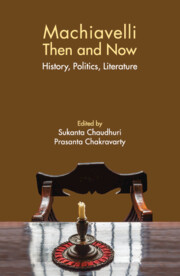2 - Machiavelli on Relationships: Knowledge of the Occasion
Published online by Cambridge University Press: 21 January 2022
Summary
I would like to describe the way in which Machiavelli develops the idea of knowledge of the opportunity or occasion. I will try to substantiate the idea, first, by showing the shocks resulting from the clash of temporalities within it; second, by addressing two related issues, the question of ‘forcing belief’ and the classic argument of the new prince giving form to matter; and third, by widening my scope and making Machiavelli a philosopher of relationships.
Knowing the Occasion
In Chapter 6 of The Prince, Machiavelli says that founders of states or communities like Moses, Cyrus, Romulus, and Theseus received nothing from fortune except the occasion or opportunity that gave them the matter or substance to imbue with a form. Without this encounter between opportunity and virtù, the first would have been in vain and the second would have languished. This means that the fortune of a founder and the opportunities that he encounters essentially consist of disorder and hardship that are, however, suitable for putting into order: as I will point out later, this is particularly clear in the Discourses on Livy (Book 1, Chapter 2). Occasion, fortune, and virtù draw their respective meanings solely from their relations with each other: none of them can have substantive value without the other two. This tense relationship between occasion, fortune, and virtù rules out both historical determinism and determinism of will, or even a harmonization of the two through the idea of a constant willingness or acceptance of what happens, or of a simple versatility as defended by Pontano in his De prudentia (1496).
As Machiavelli points out in the same chapter of The Prince, this encounter of fortune and virtù produces nothing less than a specific kind of knowledge. The excellent virtù of these founders makes it possible for the opportunity to be met or, more literally, to be known. I propose to strictly respect the terms of this remark: identifying an opportunity in this way constitutes a genuine act of knowledge, understood as an experience that affords a representation of reality. Such knowledge has the nature of an encounter, just as we can claim we have ‘known’ a hardship or ‘known’ a woman or a man through sexual intercourse. It would be an interesting exercise to give such experience a more general validity by endowing it with cognitive consistency.
- Type
- Chapter
- Information
- Machiavelli Then and NowHistory, Politics, Literature, pp. 21 - 30Publisher: Cambridge University PressPrint publication year: 2022



